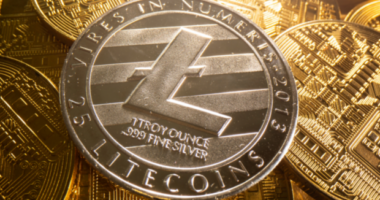In our previous articles, we explained that the project of creating Islamic tokens is not a new thing. For example, the first ever Islamic token was launched in the year 2001, with the first ever investment in the form of an Islamic token made in the year 2005. We also explained that some of the Islamic tokens which followed their predecessors may not have been strictly Muslim, but rather crypto-Islamic.
As a decentralized digital currency, Bitcoin and other cryptocurrencies have the potential to bridge the gap between the Islamic finance industry and mainstream financial institutions. In fact, one Islamic bank has already announced plans to start dabbling in cryptocurrencies. Meanwhile, the Islamic community is also working on a test version of Sharia-compliant digital currency.

While Islamic scholars have long struggled with the question of whether cryptocurrency is halal, what if it is in fact fiat currency that is not permitted?
Islam has strict rules for finance and has historically defined money as goods with intrinsic value – including gold, silver or salt. Waseem Mamlouk of the DeFi Nimbus platform argues that state-issued fiat currencies have no intrinsic value and may be incompatible with a prudent interpretation of sharia law. This would pose a problem for the burgeoning Islamic finance industry, which seeks to make financial gains in accordance with religious law.
Mined cryptocurrencies have intrinsic value because they cost a certain amount to produce – but fiat currencies, which are digitally printed on the balance sheet, have no intrinsic value.
Mamluk sees crypto-currencies as a real alternative. As vice president of capital markets at Nimbus, Mamluk is working to certify a portion of the company as Shariah-compliant, to attract a growing number of investors who want their investments to be in line with their religious beliefs. While he will certainly make a profit, Mamluk also sees Islamic finance as a way to promote responsible, long-term investing.
Mamluks assertion that fiat money has no intrinsic value is certainly controversial and would have huge implications for the Islamic finance industry should his judgment prevail. Essentially, it says that fiat is not halal. He is not the first to question the possible incompatibility of fiat money with Islamic finance, as the desire to return to the gold standard – as in classical Byzantine times – has long been the subject of academic debate.
So if we’re going to talk about someone creating sharia-compliant dollar funds, that makes no sense in the first place. However, in the case of mined cryptocurrencies, this makes sense.
I was honored to participate in a panel discussion on Challenger banks and FinTech disruption at the 1st International Islamic Fintech Summit 2019 hosted by @ashurst London. Great ideas/opportunities for fintech and crypto in Islamic finance. pic.twitter.com/oJKi4eKaSo
– Dr Kingsley Udofa (@DrKUdofa) 15. February 2019
Islamic finance
Mamluk sees cryptocurrencies as the key to better implementation of Islamic banking. In short, it is about financial and banking practices that are in line with Islamic religious teachings. These religious teachings include, first of all, the prohibition of riba, which is usually equated with usury or charging interest.
Since interest is a large part of the current DeFi landscape, Islamic DeFi landscape, which is not expected to include interest, will require customized solutions. Mr. Mamluk explained that in Islamic banking, banking fees sometimes replace income that would otherwise come from interest, but he is not in favor of this.
Banks like to play with people by using different words and terms. We will charge you a fee, but no interest – we know what that is.
Islamic economics includes the general idea that money should be earned through honest and legitimate work and not through unjust exploitation, which is often compared to the labor theory of value. For the same reason, the money received in return for labour must have real and intrinsic value.
Although there are no exact figures, The Economist magazine estimates that Islamic finance is worth $2 trillion a year and could reach $3.69 trillion by 2024, according to Gulf Business. With the number of Muslims in the world set to increase by 70% from 1.8 billion in 2015 to nearly 3 billion by 2060, according to the Pew Research Center, financial services with Islamic influences will undoubtedly continue to attract capital.
Although Islamic finance has been around for much longer, it is the unlikely sibling of the cryptocurrency industry. These two financial sectors are growing rapidly: they each control about 1% of the world’s wealth and expect to gain a much larger share in the coming years.
What are the rules?
Most Islamic banking regulations revolve around the concept of riba, which generally refers to usury. This makes paying or receiving interest haram, i.e. forbidden. You don’t get any interest on a certain amount you put in, Mamluk says.
According to him, it is illegal to sell something you don’t own, which means short selling, derivatives and maybe even day trading of shares are not allowed, since shares usually only settle at the end of each business day and you can end up selling shares before you even receive them. In terms of storage, immediate settlement of swaps in the cryptocurrency market could be the answer.
While many cryptocurrency traders would be horrified at the thought of being limited to multi-day spot trading instead of high-yield day trading, Mamluk doesn’t think anything is missing. Personally, I’ve never done anything like that, and you know, here I am, still alive and well – it’s not that hard to play by the rules, he says with a friendly smile.
Gambling, known as Maisir, is also prohibited. Partly because it’s about getting money by chance rather than by legitimate effort. A similar term, bai’ al-garar, covers any trade that involves excessive and unreasonable risk – this too is haram.
Unreasonable risk is very similar with cryptocurrencies, especially in the beginning. Dogecoin, a cryptocurrency based on speculation and memes, seems to fit the description of gambling or taking excessive risks. Is Dogecoin haram? The Mamluk believes this will be the case, but cautiously states that she has no plans and that this is pure speculation. It is not Mamlouk’s Doge (but the jury is still out).
Another important aspect of Islamic finance, Mamluk said, is to ensure that sharia-compliant funds are not mixed with non-compliant funds. This is a very difficult task for the current financial system, he said, as banks hold funds from different sources.
It could be blood money, it could be money from an arms dealer deposited in a foreign bank, where bank employees have no way of knowing where their clients’ money comes from, and therefore no way of telling other clients that the money in the bank comes from legal and approved sources.
According to Mamluk, cryptocurrencies are the key to solving many of these problems. This is primarily due to the traceability inherent in many cryptocurrencies and the fact that it is possible to mine or acquire new coins whose origin – and thus moral purity – can be absolutely proven.
The rigorous approach to Islamic finance could be the counterbalance that opens the door for a billion Muslims around the world to participate in the blockchain revolution.
Early leisure activities
Mr. Mamluk was born in Washington, D.C., in the United States, but grew up in the Kingdom of Saudi Arabia, where his father worked for Saudi Aramco, the state-owned oil company. He describes the environment in which he grew up – and still lives – as a highly intellectual international community. When he was young, he remembers being taken to see a supercomputer, one of only three in the world at the time. The experience was unforgettable and sparked his interest in technology, cryptocurrencies and financial solutions.
He returned to his native D.C. to study business law at American University, graduating in 1994. He then embarked on a career in financial IT (early fintech) and IT security consulting, staying out of court and advising financial, technology and telecom companies in the Middle East and around the world.
At the time, he says, investment banking did not exist in the Middle East. Mr. Mamluk helped found Atlas Investment Group in Amman, Jordan, which he later sold to Arab Bank, which he describes as the largest bank in the Middle East. As his career progressed, he saw the increasing dominance of computers and the Internet, prompting him to return to the US to study information technology at the University of Virginia, where he graduated in 1999, the year before the infamous Y2K bug.
Nimbus
Mamluk’s next goal is to certify a number of Nimbus solutions as Shariah-compliant, in order to reach a broader user base. Nimbus, currently based in Malta, is a DAO-driven platform that gives users access to a range of DApps, opening the door to a variety of potential income streams, including things like cryptocurrency betting, trading and lending.
How can a financial company obtain a certificate of Sharia compliance?
Neither the process nor the requirements are standardized, since Islam is not a centralized religion like, say, Catholicism. Instead, each country – for example, Pakistan, Iran, Malaysia and the Gulf Cooperation Council countries – will have its own systems and procedures.
These systems can be different, as evidenced by the Malaysian Sharia Advisory Council praising the great potential of cryptocurrencies. Others, including the Grand Mufti of Egypt and the Fatwa Center of Palestine, have already declared cryptocurrencies haram.
Mamlouk is thinking of Saudi Arabia or Bahrain, where he believes the rules are largely interchangeable. Bahrain, where the central bank recently licensed a sharia-compliant cryptocurrency exchange, seems a bit more nimble when it comes to innovation. The intention is to submit a proposal to the local sharia council.
This council has to look at different aspects – basically an audit, Mamluk says. They can then make a decision or give you advice on what you need to change to get permission. Once a project has been successfully reviewed by the Sharia Council, which examines the proposed practices, it can be declared to be in compliance with Sharia regulations.
We look forward to being blessed, but we don’t want a sharia council because it’s a burden….. For us, it’s more of a social responsibility.
From the Mamluk’s point of view, a guide to Islamic finance can be seen as going beyond the rules of a particular religion. He believes this is because they generally encourage responsible practices that do not tolerate excessive risk and emphasize transparency and fairness.
It’s a responsible investment and it’s realistic, he says of the method.
Futures
The idea of sharia councils advocating for business practices and investment vehicles is interesting and could spark an exciting collaboration between fintech innovators and religious scholars.
This could be a harbinger of a future where sharia councils will assess all types of cryptocurrency, token and smart contract projects before ruling on their suitability for Muslim investors. Mamluk agrees and says there is a huge opportunity for all kinds of evaluations and evaluation services, because we don’t have them.
As for theFi industry as a whole, Mamluk is mega-optimistic. He believes that the application of this technology will increase significantly worldwide in the coming years.
There is no way that the DeFiK will grow by less than 100% on average – every year – over the next five years, and it will get worse. People will look back in five years and say: Wow, how did I not notice that.
Related Tags:
is liquidity haramis defi halalis yield farming halalis dogecoin halal in islamis alpp halalislamic finance guru will,People also search for,Privacy settings,How Search works,is liquidity haram,is defi halal,is yield farming halal,is dogecoin halal in islam,is alpp halal,islamic finance guru will,defi islam,islamic defi


